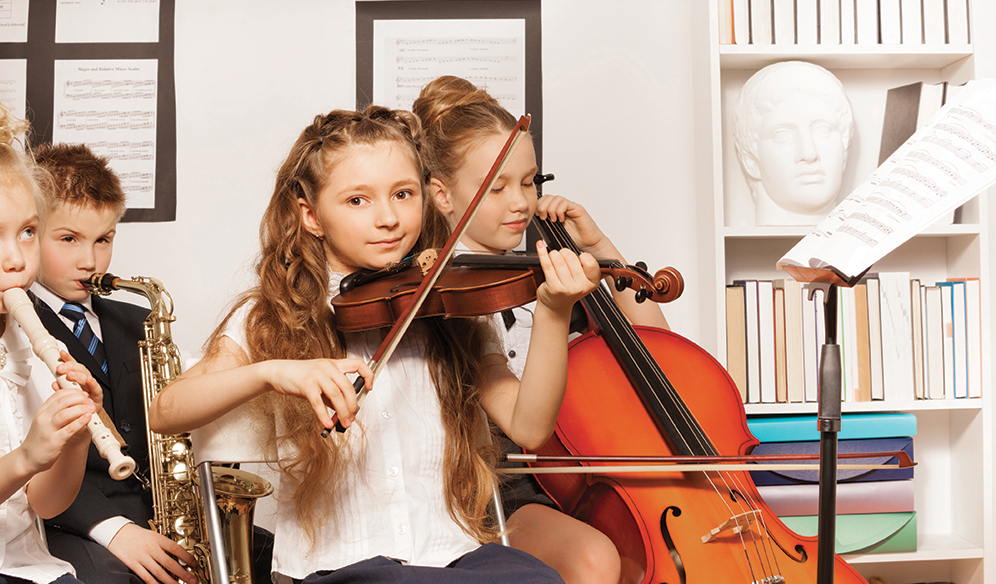Schools have impressive displays for open days, but how do you ensure what you’re seeing is the real deal, and that it’s the best fit for your child?
Prospectuses these days make a blisteringly good read – and so they should, given all the money schools throw at them. You’ll even find the occasional (glowing) inspection report bound as beautifully as a collectible first edition, all expensive gilt lettering and strokeable covers.
But while fancy literature and amazing virtual tours can give schools a catwalk gloss, seeing them in the flesh when you’re choosing between them is a must, say our area’s educational experts. Nothing, they stress, beats heading off to the open days that are such a high-profile feature of the school calendar.
“The benefits of attending open evenings are immeasurable – it’s the intangible ‘feel’ of a school that’s so important in making decisions; meeting the people is equally as important as reading the results and destinations data,” says Jo Sale, assistant principal (Post 16) at Impington College.
Experiencing the atmosphere of a school first-hand helps prospective pupils – and their families – to work out whether they’re likely to feel at home there, believes Carole Beedham, head of school at Brookes Cambridge. “Importantly, it provides an opportunity for the child to assess whether they fit the environment and, significantly, whether the school fits them.”
And, yes, open days may be packed, but getting teachers, pupils and parents all together does have its advantages, points out Richard Settle, head teacher at Sancton Wood School. “You get the chance to meet me and all the teachers in one place at one time, and ask us any questions you might have about the school, our curriculum and all our extra-curricular activities.”
“You get the chance to see the school in a very informal atmosphere”
Not only that, but open days can be a lot of fun, too, with loads of activities going on in every classroom. “You get the chance to see the school in a very informal atmosphere,” he says.
A good open day will be a masterpiece of organisation. Planning kicks off early. Pupils who shine in performing arts will be learning their lines, mastering their music or cracking their choreography within days, if not hours, of arriving back at school in September so they’re pitch – and pirouette – perfect when the crowds roll up a few weeks later.
And that’s the key point. Schools, naturally enough, want prospective parents to see them at their best. It’s not that they have anything to hide, but like any perfectionist host, they want visitors to leave feeling not just satisfied but excited, amazed and confident that the school is just the ticket for their lucky daughter or son. One hallmark of open day success is the parent who heads straight for the admissions team and demands to complete a registration form then and there.

But given that every school can end up sounding just as much a miracle of educational attainment as the next one (heads don’t get where they are without acquiring the gift of the gab on the way up) how do you distinguish between them?
One approach that has been adopted by canny parents is to break down the open day into its component parts and judge them accordingly.
You should start, just as the song says, at the very beginning. When you arrive, the staff meeters and greeters should be smartly dressed and be welcoming (if they’re not, take note). Ditto their native habitat, the reception area, which is frequently accessorised with snazzy lighting, high-quality framed pupil artwork and even the occasional spot of greenery on the side.
Less visible, but just as important, is the way that members of the school community relate to one another, says Dr Lucy Bates, assistant principal, MPW Cambridge, because they tell you a lot about the ethos of a college or school. “Do the reception staff know the students well? Are there students and teachers actively seeking to help one another? These would indicate a good sense of community. Is there a sense that the staff go the extra mile and that students are keen to seek their help and advice?”
And that applies not just to the top achievers, destined for glittering exam grades, but those who may find the learning more of a struggle. So it’s always useful to ask how schools help all their pupils fulfil their potential. “Talk to the students and ask how they are supported, as well as asking questions about how well students do in comparison with their prior attainment,” says Jo Sale at Impington College.
Similarly, it’s very easy to be impressed by the facilities, from the immaculate cricket pavilion to the stunning performing arts centre, but check that they’re well-tended – and well used. “They should be well-stocked and well-cared for as they speak volumes about the school’s attention to detail – and also enable a pupil’s talents to be nurtured,” agrees Nigel Helliwell, headmaster at St Faith’s School.

How that nurturing happens is down to a school’s ability to inspire all its pupils, whatever their interests and passions, says Charlotte Avery, headmistress at St Mary’s School, Cambridge. Art aficionado, linguist, scientist or musician, parents should ask the same questions: “What do you have to offer my child in terms of expertise, facilities, role models, peers and encouragement, to provide them with the support they need to achieve their potential?”
It all starts with the head teacher, the person ultimately responsible for the school’s direction, so it’s worth taking careful note not just of what they say but how the message is delivered. While firm leadership of a school is essential – schools buckle without it – it shouldn’t be unyielding, so neither granite nor marshmallow but somewhere on the spectrum between them.
Ed Elliott, head at The Perse, says that parents should expect the man or woman at the top to do a full hearts and mind job that wins over prospective pupils – and their parents. “They need to be convincing on both the school’s track record – inspection reports, exam results, university entry and extracurricular achievements, for example – and its pastoral soul: are pupils really enthused, cared for and supported?”

And while the head’s presentation should give you a first-hand insight into what the school is all about, don’t take it as read, says Charlotte Avery at St Mary’s. “After listening to the head’s speech, make sure to speak to your own peers too. Meet parents of children who are currently at the school and try to ascertain that what has been presented is an authentic representation of the school.”
Staff, too, should be thoroughly credible and pin-sharp, says Lucy Bates of MPW Cambridge. “Asking about their examining experience is often useful as those who examine are extremely well placed to teach exam technique. Any member of staff who gives vague answers should make you very nervous.”
And while there’s no industry-standard definition of the perfect teacher, you can also tell a lot about staff from the way they talk to pupils. “One thing they do share is the ability to communicate well with children, so perhaps the best advice is to watch how the teachers relate to the children on an open day and how the children respond,” says Ed Elliott.
“I’d ask pupil guides ‘why do you like coming to school?’ They will answer honestly”
Perhaps unsurprisingly, school insiders point out that the best source of information is often the pupils themselves. In many schools, they are likely to be the tour guides. Most will be volunteers and their honesty tends to shine through.
Ask them what they really like about life there and about the changes they’d make to the subjects on offer, the amount of homework and the way problems – including bullying – are sorted out. The answers they give and – tellingly – any silences will often give you a real insight into life there.
“The one question I would ask our pupil guides is ‘why do you like coming to school?’” says Richard Settle at Sancton Wood School. “They will always answer you honestly.”
Open days provide a valuable insight into how a school ticks, its clarity of vision and how good it will be at educating, understanding and inspiring your child. And that means weighing up all the factors – including your gut instincts, says Carole Beedham of Brookes Cambridge.
“Talk to existing parents and students to get an honest appraisal of the school,” he says. “During conversations with teachers, probe their approach to learning and how they can help children thrive, no matter their ability. Facilities are simply bricks and mortar; the heart of the school will determine whether a school feels right for your child.”

